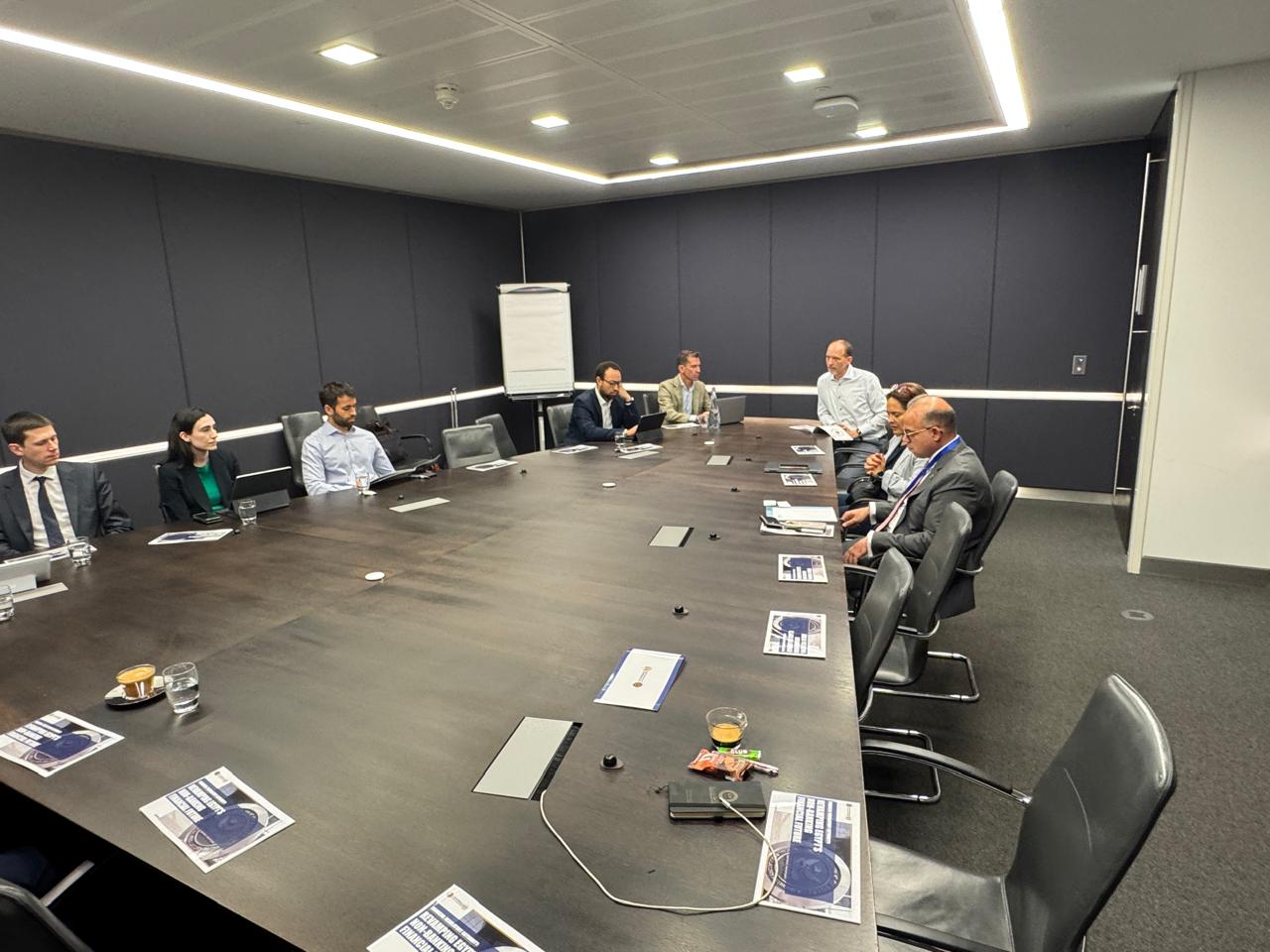- Farid engaged in around eight meetings with prominent investment and financial institutions, focusing on Egypt’s reform initiatives within the non-banking financial sector.
Dr. Mohamed Farid – FRA Chairman:
- Egypt’s insurance industry is witnessing rapid development and a qualitative leap in the legislative framework governing the insurance market following the issuance of the Unified Insurance Law.
- FRA is always keen to achieve a balance between insurance protection requirements and economic developments, contributing to enhance capabilities of the insurance sector.
- FRA actively supports the accelerated digital transformation of the insurance sector, a process initiated by the e-issuance of select insurance policies.
- FRA is committed to boost insurance sector efficiency through ongoing regulatory development and supportive initiatives.
Dr. Mohamed Farid, FRA Chairman recently met with representatives from “Jefferies”, a leading global financial institution specializing in investment banking, capital markets and financial advisory services. The session, held in London as part of a business mission organized by the British Egyptian Business Association (BEBA) titled “Egypt’s New Era… Investment Opportunities,” also witnessed a significant turnout from the broader business community and international investors. Ghada Nour, Assistant Minister of Investment and Foreign Trade and Noha Khalil, Acting CEO of The Sovereign Fund of Egypt, also participated in the discussions.
During the meeting, Dr. Farid showcased prominent investment opportunities within Egypt’s non-banking financial sectors, with a particular focus on the insurance sector. He highlighted the qualitative shift and rapid development of Egypt’s insurance industry which aligns with the national drive to foster financial inclusion and expand social protection for vulnerable populations.
These strategic engagements underscore FRA’s commitment to enhance collaboration with major international financial institutions and facilitate the exchange of insights on financial market developments and investment prospects. Such efforts are crucial for bolstering Egypt’s non-banking financial sector and attracting further foreign investment.
Dr. Farid shed lights on FRA’s recent amendments to investment rules and ratios for private insurance funds and companies, following the Unified Insurance Law’s issuance in July 2024. This landmark change has, for the first time, introduced more diversified investment channels. These new avenues include investment fund certificates in metals or metal-backed financial instruments traded on Egyptian exchanges, open-ended investment fund certificates in listed equities and venture capital and direct private equity funds within Egypt.
To foster investment diversification, FRA has issued new mandates for insurance companies. These require them to allocate a minimum of 2.5% of their paid-up capital to open-ended investment fund certificates that focus on listed equities. Additionally, 5% of invested funds must be directed towards commodity and metal investment fund certificates, including metal-backed financial instruments traded on Egyptian exchanges. Furthermore, a cap of 10% applies to personal insurance companies (and 5% for property and liability companies) for investments in real estate investment fund certificates.
This initiative aligns with Egypt’s drive for comprehensive and sustainable economic, social, and environmental development and the state’s ambitious vision to secure a decent and stable life for all citizens by fostering financial inclusion and integrating new societal segments to boost economic growth. Dr. Farid reiterated the Authority’s commitment to balance insurance protection needs with economic developments, thereby strengthening the insurance sector’s capabilities. He highlighted that since the Unified Insurance Law’s issuance, FRA has consistently worked to enhance the sector’s efficiency through supportive legislation and regulatory measures. Key among these are new controls for determining minimum capital requirements for insurance companies, mandating them to raise capital in two phases to reach EGP 600 million in the second phase, aiming to bolster their financial solvency. Additionally, the FRA has established a regulatory framework for calculating and forming technical provisions related to property and liability insurance, ensuring sound and sustainable fulfillment of obligations, and has increased the maximum limit for micro-insurance coverage, expanding protection for targeted groups and deepening insurance inclusion.
FRA has introduced comprehensive new regulations governing the establishment and licensing of insurance and re-insurance companies. These updated rules incorporate legal and technical requirements designed to ensure the quality, solvency and operational efficiency of new market entrants. Concurrently, new technical provisions have been formalized for the calculation and formation of technical reserves, specifically for life insurance and capital formation operations. This measure aims to bolster the financial stability of insurance entities and robustly safeguard policyholders’ rights.
In parallel with these regulatory developments, FRA is actively promoting the acceleration of digital transformation within the insurance sector. The Authority is undertaking intensive efforts to promote the strategic utilization of financial technology (FinTech) as a powerful instrument for broadening insurance coverage, thereby fostering financial inclusion and extending social protection to underserved segments of the population.
These digitalization efforts notably enable the e- issuance of standard insurance policies. This includes, but is not limited to, compulsory motor insurance, temporary life insurance, personal accident coverage and micro-insurance. This initiative is underpinned by FRA’s proactive issuance of regulatory decisions that support digital transformation, alongside a series of complementary resolutions pursuant to Financial Technology Law No. 5 of 2022. Notably, these include resolution No. 139 of 2023 concerning technological infrastructure and protection systems, resolution No. 140 of 2023 regulating digital identity, digital contracts and digital registries, and resolution No. 141 of 2023 establishing the outsourcing register for financial technology domains.
These initiatives are integral to FRA’s overarching vision for developing the digital infrastructure of the entire non-banking financial sector. They are designed to stimulate innovation, elevate the efficiency of insurance services and align the sector with global technological advancements, all while serving Egypt’s broader financial inclusion objectives.
Dr. Mohamed Farid, FRA Chairman reiterated the Authority’s unwavering commitment to the continuous evolution of legislative and regulatory frameworks. He affirmed FRA’s dedication to implement supportive initiatives and policies that are crucial for enhancing the efficiency of the insurance market and for achieving national goals related to social protection, financial sustainability and comprehensive economic inclusion.
Last modified: July 31, 2025
